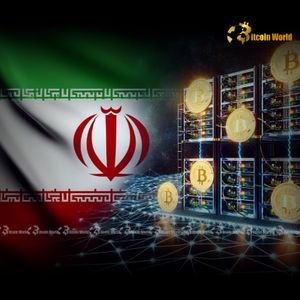BitcoinWorld Bitcoin Mining Iran: Unveiling Its Controversial Global Footprint Have you ever wondered where some of the world’s Bitcoin truly comes from? The answer might surprise you. Recent insights from Coin Bureau founder Nic Puckrin on X suggest that Bitcoin mining Iran could be a far more significant player on the global stage than many realize. Imagine a nation leveraging its abundant natural resources to power a digital revolution, all while navigating complex geopolitical currents. This revelation shines a spotlight on the intricate relationship between energy, geopolitics, and the decentralized world of cryptocurrency. The Surprising Scale of Bitcoin Mining Iran According to Nic Puckrin’s analysis, Iran may account for a substantial 3.1% of global Bitcoin mining activity. While this percentage might seem modest at first glance, it places Iran among the top contenders in the highly competitive world of cryptocurrency production. This isn’t just about individual miners; it’s a strategic national endeavor. The country reportedly capitalizes on its vast reserves of oil and gas, utilizing these cheap energy sources to fuel domestic mining operations. In some cases, this energy is even sold at highly subsidized rates to foreign operators, with Chinese entities often cited as key beneficiaries. The scale of these operations hints at a well-organized infrastructure, far beyond what casual observers might expect. It raises crucial questions about energy allocation, economic strategy, and the environmental footprint of such large-scale endeavors. Unpacking Iran Cryptocurrency Mining’s Allure What makes Iran such an attractive destination for cryptocurrency miners? The answer primarily lies in economics. The cost of electricity in Iran is remarkably low, ranging from an astonishing $0.01 to $0.05 per kilowatt-hour (kWh). To put that into perspective, the global average electricity cost for industrial use is significantly higher. This ultra-cheap energy translates directly into incredibly low operational costs for miners. Consider this: Low Production Costs: At these rates, mining a single Bitcoin could cost as little as $1,300. When compared to Bitcoin’s market price, this offers an immense profit margin, making Iran a goldmine for those with access to its energy grid. Economic Incentive: For Iran, cryptocurrency mining offers a potential pathway to generate revenue and bypass international sanctions. By converting cheap domestic energy into a globally recognized digital asset, the nation can potentially circumvent traditional financial systems. Strategic Resource Utilization: Instead of solely exporting raw oil and gas, Iran can convert a portion of its energy into a digital commodity, diversifying its economic output and potentially bolstering its financial resilience. This unique economic environment has fostered a thriving, albeit sometimes controversial, mining ecosystem within the country. The True Cost: Energy Consumption Bitcoin and State Control While the economic benefits are clear, Iran’s aggressive push into Bitcoin mining is not without its challenges and controversies. A significant concern revolves around the immense energy consumption Bitcoin mining demands. The country has faced widespread blackouts, particularly during peak demand seasons, which have been attributed in part to the surge in electricity usage by cryptocurrency miners. Furthermore, the involvement of state-affiliated entities adds another layer of complexity. Key mining operations are allegedly run by the Islamic Revolutionary Guard Corps (IRGC) and are protected by the military. This suggests a strategic, state-backed approach to leveraging Bitcoin for national interests. However, it also leads to: Regulatory Interference: Reports suggest alleged interference with regulatory shutdowns, indicating a struggle between the need for energy stability and the state’s desire to continue mining operations. Public Discontent: The energy misuse and resultant blackouts have sparked considerable public concern and frustration, highlighting a conflict between national economic strategy and the daily lives of citizens. Geopolitical Ramifications: The state’s direct involvement in mining raises questions about the use of Bitcoin in international relations, sanctions evasion, and potential for illicit financing. The delicate balance between economic gain and societal impact is a constant tightrope walk for Iranian authorities. Beyond Borders: Understanding Middle East Crypto Dynamics Iran’s foray into large-scale Bitcoin mining isn’t an isolated incident but rather a prominent example of the broader, evolving landscape of Middle East crypto adoption. The region, rich in energy resources and often subject to complex geopolitical dynamics, presents a unique environment for the growth of digital assets. Countries across the Middle East are exploring various aspects of cryptocurrency, from central bank digital currencies (CBDCs) to embracing blockchain technology for various industries. However, Iran’s approach stands out due to its direct link between state-controlled energy resources and the mining of a decentralized asset. This presents both opportunities and significant regulatory and political challenges. The Middle East’s strategic location and abundant energy make it a natural hub for energy-intensive industries like crypto mining. However, the region also grapples with: Regulatory Uncertainty: Many countries are still developing comprehensive frameworks for cryptocurrencies, leading to periods of prohibition followed by cautious acceptance. Sanctions and Compliance: For nations like Iran, the use of crypto is often viewed through the lens of sanctions evasion, complicating international relations and compliance efforts. Energy Management: Balancing the economic benefits of mining with the demands on national energy grids remains a critical challenge for all energy-rich nations considering this path. Iran’s experience offers a fascinating case study for how these factors play out in practice. The Future of Geopolitical Bitcoin : What’s Next? The narrative surrounding Iran’s significant role in Bitcoin mining underscores a critical emerging trend: the increasing intersection of cryptocurrency with national geopolitics. As nations recognize the potential of digital assets, we are likely to see more strategic maneuvering to control or influence the global hash rate. The future of geopolitical Bitcoin could involve: Energy Sovereignty: Countries with abundant and cheap energy will continue to explore cryptocurrency mining as a means of converting otherwise underutilized or undervalued resources into liquid assets. Sanctions Evasion: For sanctioned nations, Bitcoin and other cryptocurrencies will remain a tool for circumventing traditional financial blockades, pushing the boundaries of international economic warfare. Regulatory Scrutiny: International bodies and individual governments will intensify their efforts to monitor and regulate cross-border crypto flows, especially those linked to state actors or illicit activities. Environmental Concerns: The energy footprint of Bitcoin mining will continue to be a hot-button issue, prompting debates about sustainable mining practices and the broader environmental impact of digital currencies. Iran’s situation serves as a stark reminder that Bitcoin, despite its decentralized nature, operates within a world of sovereign states, each with its own agenda and strategic imperatives. Conclusion Iran’s alleged 3.1% share of global Bitcoin mining is more than just a statistic; it’s a window into the complex interplay of energy, economics, and geopolitics in the digital age. Driven by incredibly low electricity costs and potentially backed by powerful state entities, Iran has carved out a significant, albeit controversial, niche in the Bitcoin ecosystem. While it offers a pathway for economic resilience and sanctions circumvention, it also brings forth challenges like energy misuse and regulatory clashes. As the world increasingly grapples with the implications of decentralized finance, Iran’s model serves as a potent example of how nations might leverage digital assets to reshape their economic destinies and navigate a challenging global landscape. The story of Bitcoin in Iran is far from over, and its unfolding chapters will undoubtedly offer valuable lessons for the future of global finance. To learn more about the latest Bitcoin trends, explore our article on key developments shaping Bitcoin institutional adoption. This post Bitcoin Mining Iran: Unveiling Its Controversial Global Footprint first appeared on BitcoinWorld and is written by Editorial Team


















